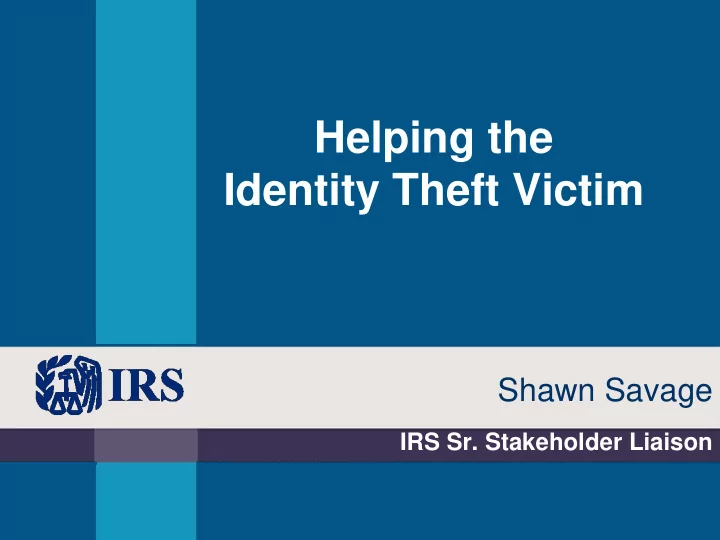

Helping the Identity Theft Victim Shawn Savage IRS Sr. Stakeholder Liaison
Seminar Objectives • Increase awareness of how to help IDT victims • Improve understanding of Taxpayer Protection Program, Identity Protection Specialized Unit and Identity Protection PIN program • Identify warning signs of identity theft • Explain changes to IRS victim assistance
Victim Assistance Centralization • IDT/Return Preparer Misconduct work moving to Accounts Management • Realigning 1,700 employees to a new organization: Identity Theft Victim Assistance • Goal: better, more consistent customer service
Tax-Related Identity Theft • Unauthorized use of SSN to file a fraudulent return for a refund • SSN key to tax-related identity theft • Not lost/stolen credit cards, wallets or health records, unless containing SSNs • SSN vulnerable to phishing emails, IRS impersonations and data breaches
Taxpayer Protection Program • Filters and modeling identify suspicious returns • Suspicious returns pulled for Taxpayer Protection Program verification and treatment stream • Correspondence sent to address on the return asking for identity verification
Taxpayer Protection Program • Letter 4883C: taxpayer must call TPP toll-free number to verify identity • Letter 5071C: taxpayer should use idverify.irs.gov to verify identity • Letter 5447C: taxpayer may either call international TPP line or mail verification
Identity Theft Warning Signs • Receive letter/notice from IRS, such as identity verification request • E-file return rejected because SSN already in use – Ensure a number not transposed or other error – Ensure dependent not claimed on two returns • Receive notice about an unknown employer
Steps for IDT Victims Federal Trade Commission recommends: • File a police report • File a complaint with FTC • Contact one of credit bureaus to place “fraud alert” • Close any financial accounts opened without your authorization
Steps for IDT Victims • For tax-related victims, IRS requires: – Complete IRS Form 14039, Identity Theft Affidavit – Respond immediately to any IRS letters or notices – Continue to file and pay taxes, even if by paper • Preparers need power of attorney (Form 2848) and CAF number to complete the form on client’s behalf
Completing a Form 14039 • Submit only for taxpayers who have suffered a loss of personally identifiable information, such as an SSN • Check the appropriate box, i.e. Box 1 if the loss of PII is affecting tax administration • Identity verification required • Follow submission instructions
Identity Theft Victim Assistance IDTVA goals are to: • Identify instances of IDT • Correct accounts quickly • Protect accounts from future IDT • Communicate with IDT victim
Identity Protection PIN • Six-digit number provides additional layer of protection for: – Self-reported identity theft victims – Victims IRS identifies – Residents of Florida, Georgia or District of Columbia • Authenticates taxpayer; IP PIN on return and IRS Master File must match • Results of IP PIN pilot under review
Identity Protection PIN • New number issued before each filing season via CP01A notice • Currently, no opt-out provision • Lost IP PINs may be retrieved online • Replacement IP PINs may be obtained from IDTVA, but subject return to scrutiny
Future of Victim Assistance • Methods of protecting taxpayer accounts under on-going review and evaluation • Movement toward online products, such as an online Form 14039 or Get an IP PIN • Results of location-specific pilot program being assessed • Centralization of inventory work underway
Additional Resources • www.irs.gov/identitytheft • Pub 5027, Identity Theft Information for Taxpayers • Pub 5911, Taxpayer Guide to Identity Theft • www.irs.gov, Search Keyword: – IP PIN – 5071C Letter
Contact Information (36 pt.) Shawn Savage Phone Number: 304.579.6873 E-Mail Address: Shawn.S.Savage@irs.gov
Recommend
More recommend